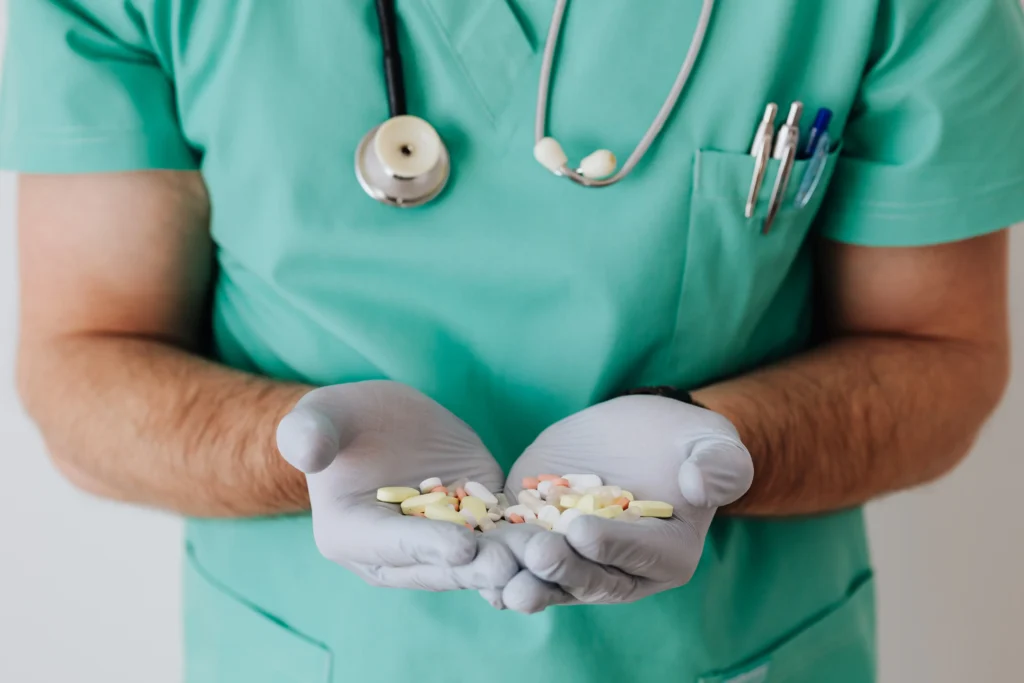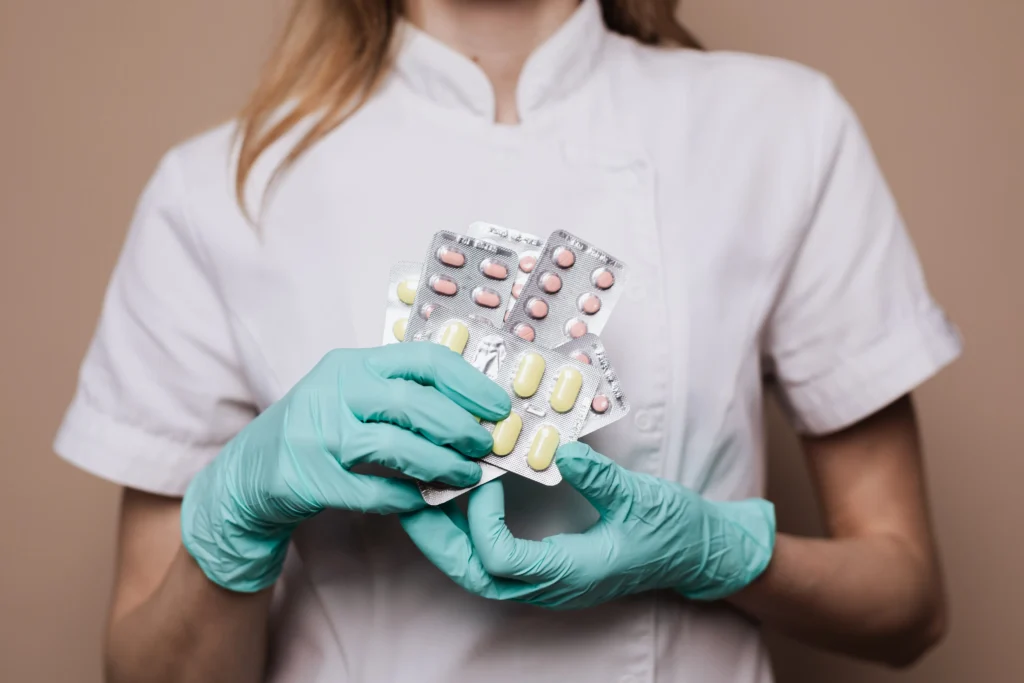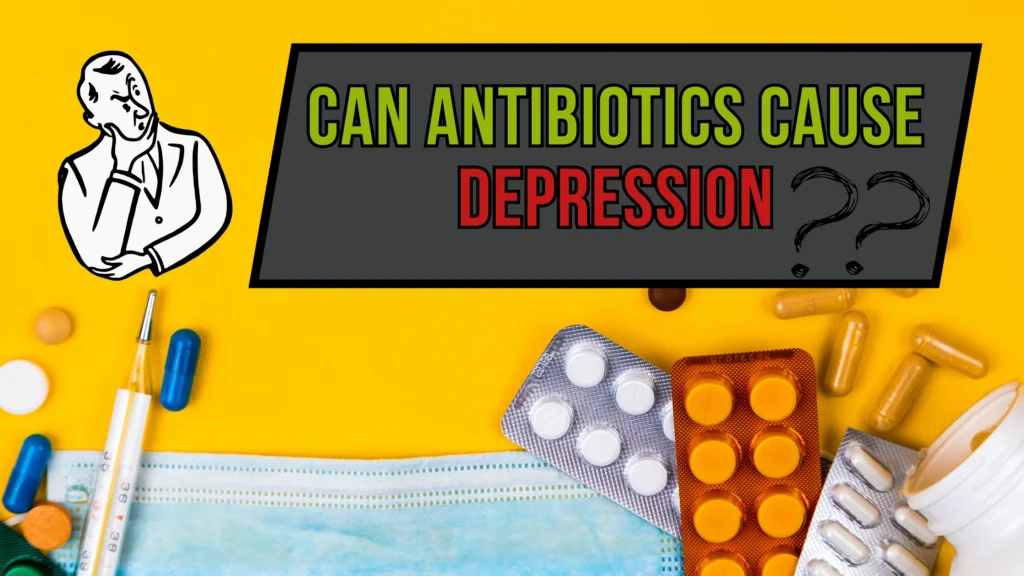Ever thought about whether antibiotics can mess with your mood? It might sound strange, but it’s a question worth asking: Can antibiotics cause depression? We often think of antibiotics as those tiny warriors fighting off bacterial invaders, but could they possibly have unintended consequences for our mental well-being?
Imagine you’re prescribed antibiotics for a nasty infection, and soon after, you start to feel a little off, unable to find pleasure in anything. It turns out that this is fairly common. Antibiotics, the superheroes who fight off harmful bacteria, are being investigated for a potential link to depression. Antibiotics are known for kicking out bacterial intruders, but they might be doing more than we thought. As we look into the link between antibiotics and low moods, we’ll explore how these meds might be affecting our mental health.
Now, why should you be interested in this exploration? Understanding the potential link between antibiotics and depression isn’t just a curious venture into the world of medicine; it’s about equipping oneself with information. By the time you finish reading this blog, you will know more about the subject and be better prepared to make choices about your health. So, let’s uncover the truth behind the question: Can antibiotics cause depression?
Table of Contents
ToggleWhat are Antibiotics and How They Work
Antibiotics are drugs that specifically attack bacteria. The basic mechanism of action of antibiotics is quite simple. When you ingest the medicine, it goes into your digestive system and gets broken down and absorbed just like the rest of the food and nutrition that you take. It then travels throughout the body via your bloodstream. When it finds the target cells, it attacks the bacterial cells in the body and either slows them down or kills them entirely.
Uses of Antibiotics
Before moving on to our main query, it would be helpful if we knew the nature and uses of antibiotics. It is already clear that antibiotics are extremely efficient at fighting bacterial diseases and infections. Some of them include:
● Skin infections
● Urinary tract infections
● Upper respiratory tract infections or other chest infections
● Sinus Infection
● Bronchitis (infection that affects the lungs)
● Ear infections
● GIT issues like diarrhea
● Eye infections such as Conjunctivitis
Side Effects:
This process is pretty effective, but just like any good thing, antibiotics also have their side effects. First of all, not all bacteria in our body are harmful, and there are plenty of useful bacteria in our gut. The medicine, not being able to distinguish between the two, also kills useful bacteria, disturbing the balance. Even though it rarely affects the immune system directly, it can have an indirect effect on it. Antibiotics, just like any other kind of medication, have the potential to affect many functions and processes in our body.
Depression: Understanding the Condition
Before going deeper into the topic of “Can antibiotics cause depression?”, let’s take a moment to overview the nature of depression and what it looks like for most people.
Depression is a type of psychological condition marked by a constant state of sadness and an unwillingness to engage in tasks that you previously found pleasurable. A person can either have depressive traits (i.e., have some qualities of depression) or they might qualify for the diagnosis of clinical depression.
In order to qualify for a diagnosis of major depressive disorder, one must show a list of signs and symptoms other than the two major signs mentioned above for at least a period of two weeks. These include:
- Gaining or losing considerable amount of weight
- Unable to sleep or being more sleepy than usual (insomnia or hypersomnia)
- Being restless or slowed down (psychomotor agitation and retardation)
- Being or feeling tired most of the time (fatigue)
- Feeling like you are worthless
- High amount of guilt
- Unable to focus or diminished concentration
- No will to live or suicidal ideation
Apart from these symptoms, depression can manifest as feeling angry, frustrated, irritated, or hopeless. Many people feel empty on the inside, or they may experience shallowness in their emotions. Depending on individual circumstances and differences, the symptoms and their severity look different.
Importance of Recognizing and Addressing Depression:
Depending on the individual, the beginning of depression can be a slippery slope, or it may start all of a sudden. The trigger behind it can be genetic, environmental, or psychological. However it may start, it is important to recognize it early on. It is imperative to know when normal sadness is beginning to transform into depression so that it can be responded to with appropriate intervention. If not, it can cause severe dysfunction in many aspects of an individual’s life.

Can Antibiotics Affect Mental Health?
Oftentimes, medications taken for physical ailments have secondary effects as well, including producing some psychological symptoms. But can antibiotics do that? Can antibiotics have an effect on our mental health? Does it have the potential to produce psychological symptoms? It is well known that many medications have the ability to produce psychological symptoms, including depression. But can antibiotics do that? Can antibiotics cause depression?
To answer this question, we will have to first explore the relationship between antibiotics and mental health, if there is any, whether direct or indirect. Then we can answer our question: Can antibiotics cause depression? In this blog post, we are going to do exactly that, and by the end, you will be more aware of the potential of antibiotics to interfere with your mental health and their potential to cause depression.
In the majority of cases, antibiotics do not affect the brain or the nervous system, but sometimes there can be an indirect influence. One path through which the effects of antibiotics can potentially reach the nervous system is called the “gut-brain axis”. Just like every other system in your body, your gut is also connected to your brain.
To understand this connection, imagine that your gut and your brain are two friends who regularly chat over the phone with each other, updating one another about what is happening. As a result of this flow of information, the cognitive and emotional centers are connected to the intestinal systems. The bacteria residing in your gut, therefore, have the potential to affect your emotions and cognitive systems. Antibiotics have the potential to disturb this gut microbiota. According to one study, taking a course for one week can disturb your gut microbiota for several weeks. (Yadav M, Chauhan NS., 2022)
This pathway has been the target of many research studies.
- One study, for instance, showed that the gut microbiota impacts the levels of an amino acid called tryptophan, which is a key component in the formation of a mood-regulating neurotransmitter called serotonin. (Dinan K, 2022).
- The gut microbiome is shown to be connected with the brain through the vagus nerve.(Chakrabarti A. et al., 2022). Certain bacteria from the gut reach the brain through this nerve. In rodents, this fact was established because when the vagus nerve is severed, this bacteria can no longer impact their behavior.
Plenty of attention has been paid to the mental health side effects of antibiotics.
- Many antibiotics are shown to cause the depletion of gut bacteria, resulting in mental health symptoms like anxiety and depression. (Lach G, et al., 2020)
- According to the findings of another study, some antibiotics, like penicillin and cephalosporines, act as inhibitors of GABA receptors. GABA receptors are known to produce calming effects in the body and control anxiety, fear, and stress. Low levels of these neurotransmitters can lead to many mental health issues, including severe anxiety. (Sugimoto M. et. al., 2002)
- Antibiotics like penicillin, cephalosporins, fluoroquinolones, and macrolides have been found to cause different types of delirium. These types included symptoms like seizures, abnormal muscle coordination and even psychosis. Though more research evidence is needed to establish this connection. (American Academy of Neurology, 2016)
- In rare conditions, some antibiotics like metronidazole and clarithromycin can cause psychotic symptoms as well. However this is not the case for most people. (Katherine Dinan, 2022)
Can Antibiotics Cause Depression?
Many antibiotics have been linked with CNS effects like seizures, insomnia, restlessness, dizziness, nervousness, hallucinations etc. but can antibiotics cause depression?
Many studies have found this to be true. For instance:
- First case of antibiotics induced depression was reported in 2010. A 75 year old man become severely depressed and committed suicide after given antibiotics for a surgery. He had no previous history of mental illness.
- One study found out that those participants who have taken antibiotics in the past three months showed a strong emotional bias towards negative information and sadness. (Katerina V.-A. Johnson, Laura Steenbergen, 2022)
- It was found that several antibiotics are related to an increase in the risk of several psychological disorders including depression through neurological, metabolically, and immunological pathways. (Lurie I, et al., 2015)
- A study by Desbonnet et al. discovered that exposure to broad‐spectrum antibiotics can lead to decrease in oxytocin levels in the brain. This decrease can lead to depression as well.
- Same study also shows that male children and adolescents are more susceptible to depression caused by antibiotics. While females are more prone to hormonal changes caused by antibiotics.
- In one study 94 patients were given fluoroquinolones. Out of them 62% reported depressive symptoms. (Kaur K, Fayad R, Saxena A, Frizzell N, Chanda A, Das S, et al., 2016)
- Antibiotics can also mess up the activity of hypothalamic–pituitary–adrenal axis (HPA), the body’s main response system which is then linked with increased risk of depression and suicidal ideation.
It is thus clear that antibiotics do have the potential to cause depression. In addition to the above findings, it is also shown that some antibiotics can cause depression in some other ways. For instance, some antibiotics can cause severe allergic reactions which may impact mental health. They can also cause sleep disturbances like insomnia. Depressive symptoms can result if a person is stressed out and unable to sleep. The stress of illness and needing antibiotics itself can cause a depressive state, however it’s an indirect connection and not the fault of antibiotics itself. Other than that, some antibiotics can affect the metabolism of psychiatric medications interfering with their progress.

Antibiotics That are Commonly Linked with Depression
Now that we have established the fact that antibiotics can actually cause depression, we need to know whether all antibiotics cause depression or just a specific class has the potential to cause depression. We also need to know if the risk is equal for everyone or there are individual differences.
The antibiotics that are most commonly found to be causing depression as a side effect include:
- Fluoroquinolones (levofloxacin, moxifloxacin)
- Some have reported depressive symptoms with the use of Minocycline which is used to treat acne, but the studies are mixed.
- Quinolones and ciprofloxacin are also linked with risks of depression.
Some positive aspects of relationship between antibiotics and depression
It should also be noted that the relationship between depression and antibiotics is not all negative. It is interesting to note that the first antidepressant named isoniazid was actually an antibiotic. There were unexpected side effects of this antibiotic including euphoria, improved sleep and appetite due to which it was used as a therapeutic drug for depression.
Recent studies have found out that some antidepressants such as SSRIs and fluoxetine have antibiotic qualities as well. (Cussotto S, Clarke G, Dinan TG, Cryan JF., 2021). The antibiotic minocycline was also found helpful for psychotic depression. (Miyaoka et al 2012). This positive side of the picture means that antibiotics are not all bad for the mental health of a person. But can we say that the positives outweigh the shortcomings?
Risk Factors and Vulnerability
There are a few important factors that increase our vulnerability to mental health issues including depression while taking antibiotics. These include:
- Individual sensitivity: People react in different ways to different medications. Individual history and needs, therefore, should be kept in mind by the physician.
- Type of antibiotic: Some antibiotics are more likely than others to lead to mental health issues. Broad spectrum antibiotics often act on many different types of bacteria, therefore more likely to disturb the balance of your body.
- Dose and duration: The longer you are on antibiotics, the greater the risk of developing depression.
- Previous psychiatric history, existing mental health conditions and family history of mental disorders can increase the likelihood of depression.
- Certain age groups such as children and elderly are more susceptible to depression caused by antibiotics.
Strategies for Managing Depression
Now that we have an answer to our question; can antibiotics cause depression? The next question is what can we do about it. There are a few practical tips that can be used while taking antibiotics in order to prevent the development of depression. They include:
- Consulting your healthcare provider is a must before taking any steps on your own. Remember that an expert can view the full picture a lot better and make an
- Ask about alternatives if the medicine you are taking is causing you too much problem.
- Follow dosage and duration instructions and make sure to not prolong the duration.
- Taking probiotics can help you optimize your gut function.
- Monitor your mood for any changes.
- Avoid taking unnecessary antibiotics
- Seeking therapy will help keep your depression in check.
If you still develop depression, there are a few strategies to help you. For instance, seeking therapy, making sure that you have a support system, paying attention to your diet, and regular exercise can benefit you a lot.
Conclusion
To summarize all of this discussion on “Can Antibiotics Cause Depression?”, it is clear from the research studies and the associated factors that antibiotics do have the potential to cause psychological issues including depression. But if you have to take antibiotics, there is nothing to be afraid of. There is no guarantee that you will develop depression as a result of taking antibiotics. Many people safely consume them without developing any depression related symptoms. Sure, the risk is there just like it is with any other medication. In majority cases, antibiotics are life saving drugs, however, just like any good thing it has a bad side as well.
It should be kept in mind that in this case, there is no single advice that will fit everyone. It all depends on individual basis, how a person will react to the medication and their history with mental health issues specially depression. Depression on its own is a complicated issue as well and there is no single cause for it. It is therefore of utmost importance that you seek professional help.
Awareness in this regard is very important as well. It is just as important that you do not self-medicate and do not ignore signs of depression if you feel any. The reason why it is imperative to stay in touch with your healthcare provider is that they can provide you with advice that is tailored to your needs.
Keep in mind that there is always some downside to every good thing. Antibiotics are in many ways a miracle drug. And with the rapid developments that are happening in the fields of medicine, psychiatry, and microbiology, hopefully, some day, we will be able to find a way to avoid these side effects entirely. Until then, all we can do is be aware and take as much care as we can of ourselves, our bodies and our minds.
Recommendations and Resources
To further educate yourself about this topic, you can consult various resources available online. To get started you can consult:
- Food and drug administration (FDA). They have plenty of resources available to educate you on antibiotics and their usages.
- The Center for Disease control (CDC) is also a government website to help you know more about various types of antibiotics
- The National Alliance on Mental Illness is a nationwide organization that spreads awareness about mental health issues including depression. They also have a helpline that you can contact in case of emergency.
- The Anxiety and Depression Association of America (ADAA) will not only help you in getting a better picture of your problem, they will also help you find a suitable therapist that you can contact.
- Find a therapist will match you with a therapist based on your needs and requirements.
Self-Help Books
If you are suffering from depression, you can check out some self-help guides as well.
- The Mindful Way Through Depression by By Mark Williams, John Teasdale, Zindel Segal, and Jon Kabat-Zinn
- I Don’t Want to Talk About It: Overcoming the Secret Legacy of Male depression by By Terrance Real is helpful specially for men suffering from depression.
- A Mind of Your Own: The Truth About Depression and How Women Can Heal Their Bodies to Reclaim Their Lives. By Kelly Brogan, M.D., and Kristin Loberg is specifically for women struggling with depression.

